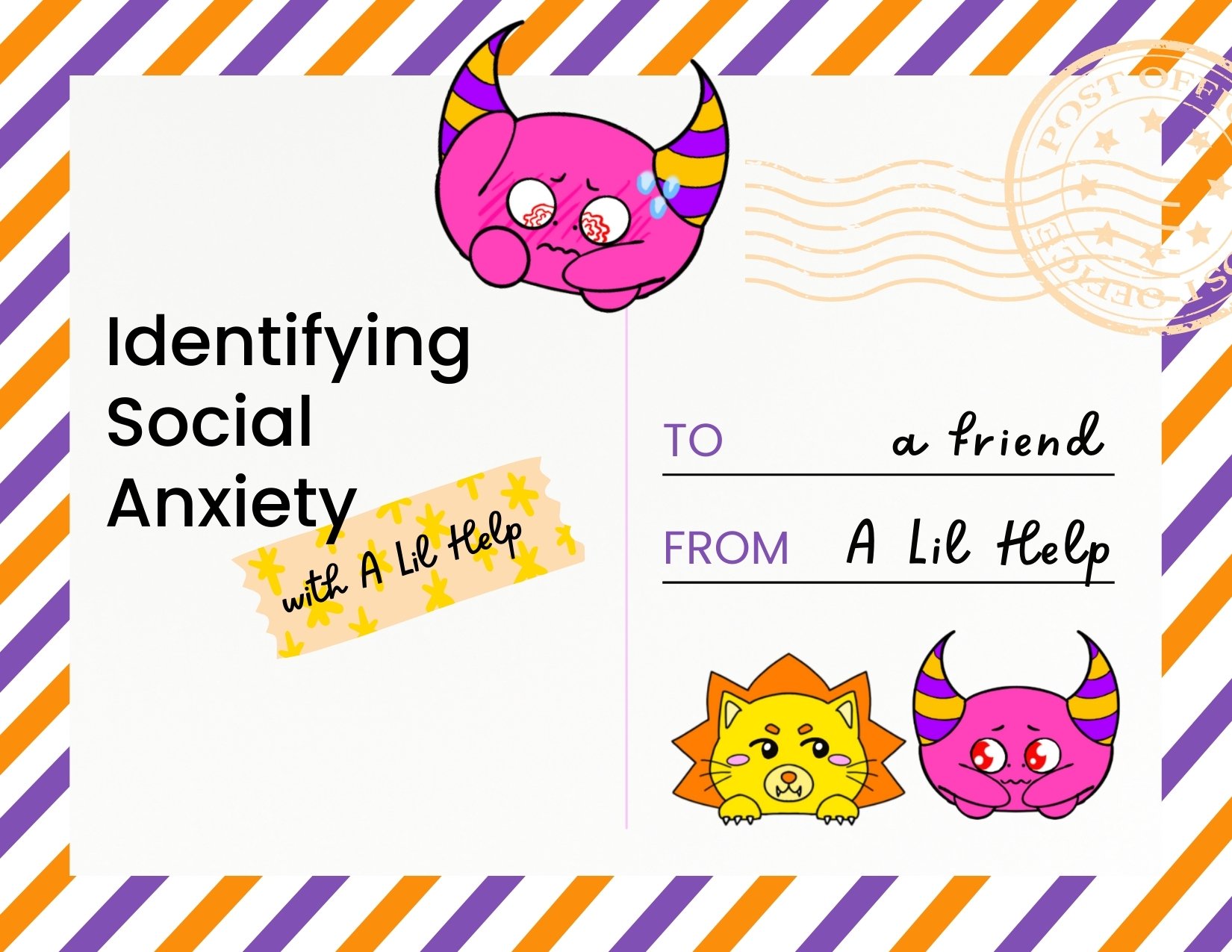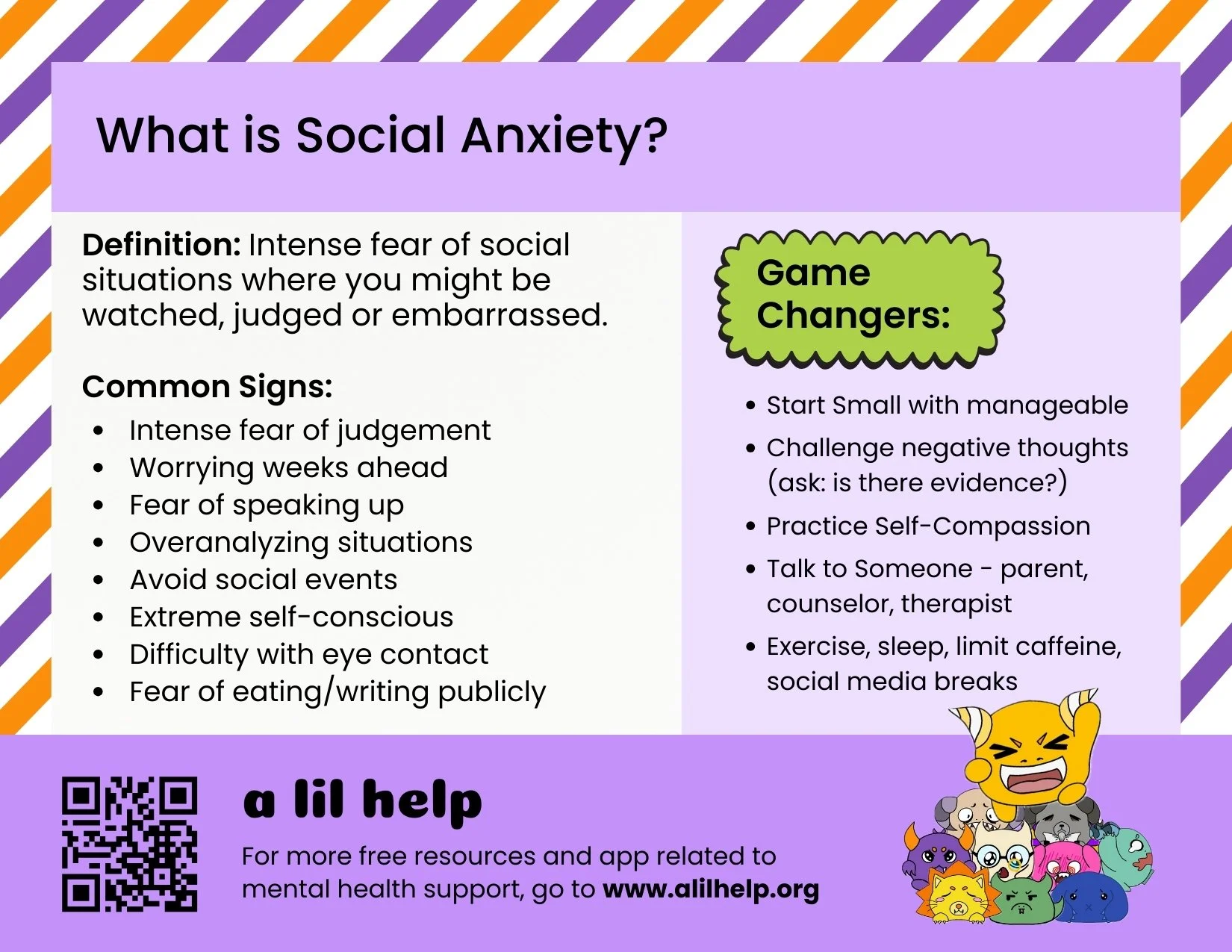

Remember
Social anxiety can seem scary but with the right coping mechanisms you can learn to live the life you want.
What is Social Anxiety?
Written by Stella W.
Imagine this: You're walking up to your friend group at lunch, and suddenly your mind floods with worry. What if they stop talking when you arrive? What if they're annoyed you're interrupting? What if they were just talking about you? Or maybe you're texting in the group chat, but you delete and rewrite your message five times, convinced it sounds stupid. You finally hit send, then spend the next hour panicking because no one responded right away. Sound familiar? That might be social anxiety.
Social anxiety is more than just being shy or nervous around new people. It's an intense fear of social situations where you might be watched, judged, or embarrassed. And here's what's important to know: it's one of the most common types of anxiety, especially among teens, and it's absolutely treatable.
What Makes Social Anxiety Different?
Let's get clear on what we're talking about:
💜 Shyness vs. Social Anxiety: Being shy means you might feel a little uncomfortable meeting new people, but you can usually warm up and enjoy yourself. Social anxiety is more intense. It's when the fear of judgment is so strong that it stops you from doing things you want or need to do, like participating in class, going to social events, or even eating in front of others.
💜 Normal Nervousness vs. Social Anxiety: Everyone feels nervous sometimes before giving a presentation or meeting someone new. That's your body's natural response. But with social anxiety, that nervousness doesn't fade. It builds up before the event, peaks during it, and lingers afterward as you replay every moment, convinced you messed up.
💜 What It Actually Feels Like: Social anxiety isn't just “in your head.” It shows up in your body too. You might experience blushing, sweating, trembling, a racing heart, nausea, or feeling like your mind went completely blank. Afterward, you might spend hours obsessing over what you said or did, convinced everyone thought you were weird.
What Are the Signs?
Social anxiety can look different for everyone, but common experiences include:
✔️ intense fear of situations where you might be judged or embarrassed
✔️ avoiding social situations, even ones you want to attend
✔️ worrying for days or weeks before a social event
✔️ extreme self-consciousness in front of others
✔️ fear of talking to strangers, speaking up in class, or performing in front of people
✔️ difficulty making eye contact or speaking loudly enough
✔️ physical symptoms like blushing, sweating, shaking, or stomach issues
✔️ overanalyzing social interactions afterward and assuming the worst
✔️ fear of eating, drinking, or writing in front of others
If these feelings are so strong that they're affecting your grades, friendships, or mental health, that’s when social anxiety needs attention.
Why Does This Happen?
Social anxiety can develop for lots of reasons. Maybe you had an embarrassing experience that stuck with you. Maybe you’ve always been sensitive to what others think.
Your brain is trying to protect you from perceived danger. When you walk into a room full of people, your brain might sound alarm bells like you’re facing a real threat. Spoiler: you're not. But your body doesn’t know that, so it reacts as if you are.
Myth Buster Alert
✖️ Myth: Social anxiety is just an excuse for being antisocial or rude.
✔️ Fact: Social anxiety is a real condition, not a personality flaw. People with social anxiety often want to connect with others.
✖️ Myth: You just need to “get over it” or “be more confident.”
✔️ Fact: Social anxiety takes real work, support, and sometimes professional help to manage.
How to Deal
The good news? Social anxiety is one of the most treatable forms of anxiety. Here's what can help:
💜 Start Small: You don't have to dive into your biggest fear right away. Start with smaller, manageable social situations and gradually work your way up. Maybe that's saying hi to one person in the hallway before trying to join a group conversation.
💜 Challenge Your Thoughts: Social anxiety loves to tell you lies like “everyone is judging you” or “you’re going to embarrass yourself.” Learn to question those thoughts. Ask yourself: Is there actual evidence for this? What would I tell a friend who was thinking this way?
💜 Practice Self-Compassion: Be kind to yourself. You are worthy of connection and friendship.
💜 Talk to Someone: Whether it’s a parent, school counselor, trusted adult, or therapist, opening up about what you're experiencing is huge. Therapists who specialize in social anxiety can teach you techniques like cognitive behavioral therapy (CBT) or exposure therapy, which are proven to help.
💜 Take Care of Your Body: Exercise, sleep, and nutrition all affect anxiety levels. Moving your body, getting enough rest, and limiting caffeine can make social situations feel less overwhelming.
💜 Limit Social Media: Constantly scrolling can fuel comparison and self-doubt. Taking breaks from apps can give your brain space to breathe.
💜 Consider Professional Help: If social anxiety is really interfering with your life, therapy can be a game-changer.
The Bottom Line
Social anxiety can make you feel isolated and misunderstood, but you're not alone in this. With the right support and strategies, you can learn to manage it and start living the social life you deserve.
DISCLAIMER: This article is for informational and educational purposes only, from publicly available information. It is not medical or professional advice. If you’re struggling, talk to a trusted adult, counselor, or healthcare professional.
